道教简介(英语)
介绍道教的英语作文

The Essence of Taoism: Harmony and theWay of NatureTaoism, a profound philosophy and religion originatingin ancient China, has left an indelible imprint on the cultural landscape of the East. Rooted in the principles of harmony, simplicity, and the Way of Nature, Taoism espouses a way of life that encourages individuals to follow the natural flow of events, embrace change, and cultivate inner peace.At the core of Taoist belief is the concept of "Tao," which translates as "the Way" or "the Path." Tao represents the fundamental principle governing the universe, embodying both the observable laws of nature and the intangibleforces that shape our reality. The Tao is seen as thesource of all being, the ultimate reality that gives riseto all things in the universe.A key aspect of Taoism is the promotion of harmony with nature and the universe. Taoists believe that the natural world operates according to its own inherent laws, and that humans should strive to align their actions with these laws. This means embracing simplicity, avoiding excess, andliving in harmony with the cycles of nature. Taoists often advocate for a lifestyle that is free from artificial constraints, emphasizing the importance of being in tunewith one's surroundings and the rhythm of nature.Another cornerstone of Taoist philosophy is the concept of wu-wei, which translates as "non-action" or "effortless action." Wu-wei does not mean literal inaction, but rathera state of mind where one acts spontaneously and naturally, without forcing or straining. This principle encourages individuals to let go of attachments and desires, and to trust in the natural flow of events. By doing so, Taoists believe that one can achieve a state of inner tranquility and harmony.Taoism also places a strong emphasis on personal and spiritual development. Through practices such as meditation, qigong (breathwork), and the study of Taoist texts, individuals can cultivate their inner strength and wisdom. Taoists believe that by attuning themselves to the Tao,they can gain insights into the workings of the universeand find their own place within it.In modern times, Taoism has found new relevance and popularity. Its principles of harmony, simplicity, andinner peace resonate deeply with many people in today'sfast-paced and often stressful world. Taoist practices such as meditation and qigong have been incorporated intovarious wellness and self-care routines, and Taoist ideas have influenced fields as diverse as environmentalism, art, and philosophy.In conclusion, Taoism is a rich and complex philosophy that offers a unique perspective on life and the universe. By embracing the principles of harmony, simplicity, and the Way of Nature, Taoists seek to live in alignment with the Tao and achieve a state of inner peace and tranquility. The influence of Taoism extends beyond the borders of China, influencing cultures and individuals across the globe.**道教精髓:和谐与自然之道**道教,这一源于古代中国的深邃哲学与宗教,已在东方文化景观中留下了不可磨灭的印记。
道家英语简介
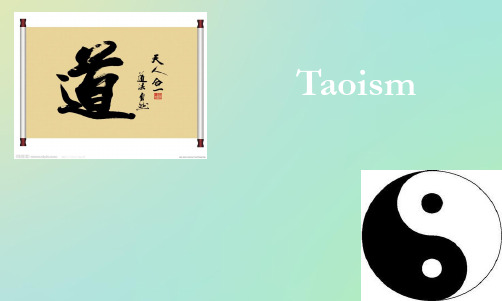
Chuang Tzu, two scholars who
dedicated their lives two balancing their inner spirits.
Totem
The most common graphic representation of Taoist theology is the circular Yin Yang figure. It represents the balance of opposites in the universe. When they are equally present, all is calm. When one is outweighed by the other , there is confusion and disarray. The Yin and Yang are a model that the faithful follow, an aid that allows each person to contemplate the state of his or her lives.
Taoism
Taoism is the native religion of China , it also be called Daoism or Taoism . Taoism is China’s traditional philosophy.
Taoism
Origin
History Representative
Content
Principles
Taoist theology focuses on doctrines of Wu wei (action that does not involve struggle or excessive effort), spontaneity, humanism, relativism and emptiness. This philosophical aspect of Taoism emphasizes various themes found in the Tao Te Ching (道德经)such as naturalness, vitality, peace,“yielding”(Wu wei),emptiness (refinement), detachment, the strength of softness(of flexibility),and in the Zhuangzi such as receptiveness, spontaneity, the relativism of human ways of life, ways of speaker’s guiding behavior. Taoism is a religion.
英语介绍道教
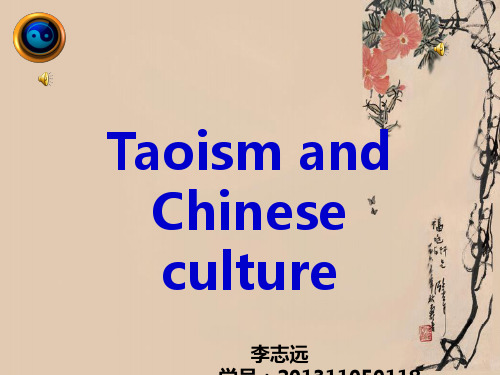
Zhengyi
正一派
The Zhengyi formed in the Yuan Dynasty, It's birthplace was where in Long hu Mountain of Jiangxi provice,The Zhengyi Taoist without living home,they can get married and have children.
道 符
部文咒多神具种与符 分化〄有力有神天咒 〃的是 〄治秘神是 重中 道病符沟道 要国多教驱号通教 组传种差魔〄的用 成统符不的它一来 700
Amulet
of
Taoism
It helps you with exam success
考 试 顺 利 符
道 符
Amulet
of
Taoism
It can reduce the quarrel between husband and wife, promote emotion between husband and wife.
全正派由宋代道士王重阳创 立,它是道教的最主要的门 派,全正派的道士必须出家, 不能有妻室。
正一派形成于元代,它的祖 庭在江西龙虎山,正一派的 道士可以不用出家,可以有 家室。
4、Taoism and Chinese medicine
道教与中医
The core concept of Chinese medicine from the Taoism, Taoism advocates a balance of yin and yang, And by keeping the body's balance of traditional Chinese medicine to treat the disease concept is comes from this. In ancient of China, many Taoists was doctor also.
道家文化(英文介绍)
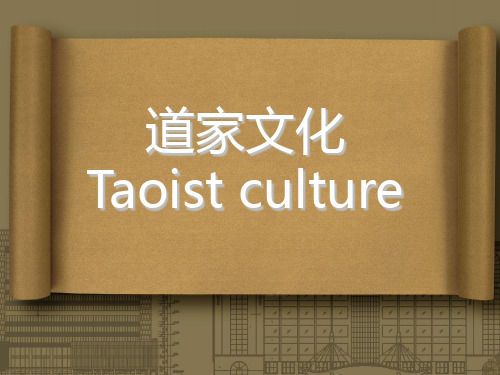
Han wei jin period is the important period of the development of Taoism in our country. The han political culture and society in weijin metaphysics purchase directly affects the behavior of Taoism and knowledge exist. Although they have the same out of awareness of the doctrine of zhuangzi, but the bamboo groves QiXian et behavior in Taoism on people's behavior rules have wind is first important to. Wei and jin dynasty's political environment and social atmosphere for Taoism is the rare opportunity of development and power. Eastern jin famous Taoist scholar ge hong "holding tastes" in Taoism system has an important position, and ge hong himself is also considered important characters of Taoism. Plays an important role on the development of the Taoist school.
道家文化(英文介绍)
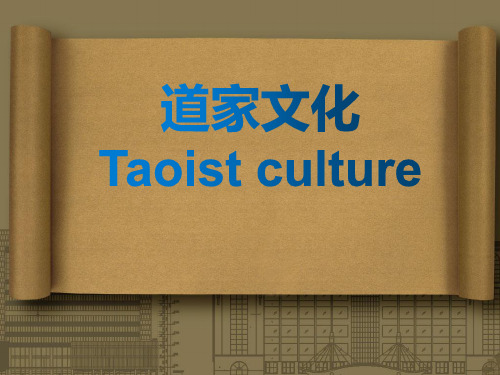
Page 5
Introduction of the 《daodejing》
The 《daodejing》, also called "moral true through", "Lao zi", "five thousand words", "Lao tze five thousand wen", is the ancient Chinese book before separation, pre-qin scholars were lifted up by all the time, the legend is the spring and autumn period of laozi (namely Li Er), is an important source of Taoist thought. Moral by consists of two papers, the original last "jing", the next "DE", is not divided into chapters, instead of "Taoism" after 37 in the previous chapter, chapter 38 after for the sutra, and is divided into 81 chapters. Is work first complete in the history of Chinese philosophy, ideological content is rare's sense of honor, such a language. By the Chinese ancestors as the king of millions. According to UNESCO statistics, the daodejing is apart from the bible has been translated into foreign languages the biggest publishing culture of classics.
Taoism(道教简介 英文版)
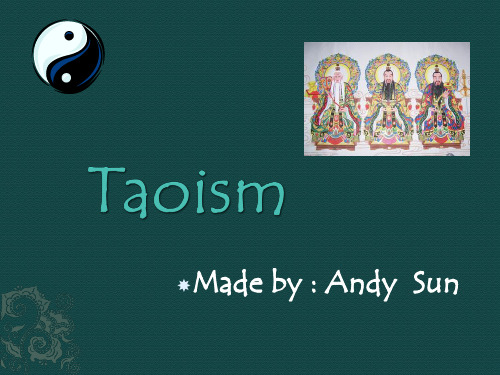
Made by : Andy Sun
Taoism (or Daoism) is a philosophical, ethical, political and religious tradition of Chinese origin that emphasizes living in harmony with the Tao (also called as Dao). The term Tao means "way", "path" or "principle", and can also be found in Chinese philosophies and religions other than Taoism. Laozi is traditionally regarded as the founder of Taoism
Taoism draws its cosmological notions from the tenets of the School of Yin Yang, the Tao Te Ching, a compact and ambiguous book containing teachings attributed to Laozi . The Tao Te Ching is dated to the late 4th century BCE , which is widely considered as keystone work. Together with the writings of Zhuang zi, these two texts build the philosophical foundation of Taoism.
道家介绍英语作文
道家介绍英语作文Daoism, also known as Taoism, is a philosophical and spiritual tradition that originated in ancient China. It is based on the teachings of Laozi, a legendary figure who is said to have written the Tao Te Ching, a foundational text of Daoist philosophy. Daoism emphasizes the concept of the Dao, which can be translated as "the Way" or "the Path." The Dao is often described as the underlying principle of the universe, the source of all things, and the ultimate reality.One of the key ideas in Daoism is the idea of wu wei, which can be translated as "non-action" or "effortless action." This concept suggests that one should live in harmony with the natural flow of the universe, rather than trying to force things to happen. By following the Dao and practicing wu wei, one can achieve a state of spontaneous and effortless action, free from the constraints of ego and desire.In addition to wu wei, Daoism also emphasizes the importance of simplicity, humility, and living in harmony with nature. Daoists often seek to cultivate a sense of inner peace and tranquility through practices such as meditation, qigong, and tai chi. These practices are designed to help individuals cultivatetheir vital energy, or qi, and achieve a state of balance and harmony between body, mind, and spirit.Another important aspect of Daoism is the belief in the interconnectedness of all things. Daoists see the world as a complex and interconnected web of relationships, where everything is interdependent and constantly in flux. This perspective encourages individuals to cultivate an attitude of compassion and empathy towards all living beings, and to strive for harmony and balance in all aspects of their lives.Daoism also includes a rich tradition of mythology, folklore, and symbolism, with a pantheon of deities, immortals, and legendary figures. These stories and symbols are often used to convey deeper philosophical truths and moral teachings, and to inspire individuals to seek wisdom, virtue, and enlightenment.Overall, Daoism is a profound and multifaceted tradition that offers a unique perspective on the nature of reality, the human condition, and the purpose of life. Its teachings continue to inspire and influence people around the world, offering a timeless message of peace, harmony, and spiritual fulfillment.。
道家文化(英文介绍)
Page 6
The development history of Taoism
During the warring states period, the immortal faith has quite wide. This is, there are many records book of fairy tales, the book contains many legends about fairy wonderland, fairy medicine such as text.
Page 9
Thank you watch
thinker, founder of the Taoist o zi is
a world culture celebrities, one of the
world's one hundred historical figures, only
have the daodejing (also called "Lao zi"), the
Page 7
Han wei jin period is the important period of the development of Taoism in our country. The han political culture and society in weijin metaphysics purchase directly affects the behavior of Taoism and knowledge exist. Although they have the same out of awareness of the doctrine of zhuangzi, but the bamboo groves QiXian et behavior in Taoism on people's behavior rules have wind is first important to. Wei and jin dynasty's political environment and social atmosphere for Taoism is the rare opportunity of development and power. Eastern jin famous Taoist scholar ge hong "holding tastes" in Taoism system has an important position, and ge hong himself is also considered important characters of Taoism. Plays an important role on the development of the Taoist school.
介绍中国道教的英语作文
As a high school student deeply fascinated by the rich tapestry of Chinese culture, I find myself drawn to the mystical and profound teachings of Taoism, one of the most ancient and influential philosophies that have shaped the Chinese mindset for millennia. This essay aims to offer a glimpse into the world of Taoism, exploring its origins, core principles, and its impact on Chinese society and beyond.Taoism, also known as Daoism, is a philosophical and religious tradition that dates back to the 6th century BCE, with the legendary figure Laozi often revered as its founder. The term Tao itself translates to the Way or the Path, encapsulating the essence of the universes natural order. The foundational text of Taoism is the Tao Te Ching, attributed to Laozi, which offers profound wisdom on leading a life in harmony with the Tao.At the heart of Taoist philosophy lies the concept of Wu Wei, or nonaction, which is not about inactivity but rather about aligning oneself with the natural flow of life, acting without force or struggle. This principle encourages individuals to embrace spontaneity and simplicity, to be in tune with the everchanging rhythms of the universe.One of the most captivating aspects of Taoism is its reverence for nature. Taoists believe that the natural world is a reflection of the Tao, and by observing and learning from nature, one can gain insight into the Taos workings. This deep connection with the environment is evident in the Taoist practice of Qigong and Tai Chi, which are forms of meditative movement that aim to cultivate the bodys vital energy, or Qi, in harmony with the natural world.Taoism also emphasizes the balance of Yin and Yang, the complementary forces that make up the universe. This concept is not limited to the physical realm but extends to the emotional and spiritual aspects of life. The interplay of Yin and Yang is a reminder of the importance of balance and moderation in all aspects of life, a philosophy that has deeply influenced Chinese medicine, art, and even governance.As a high school student, my understanding of Taoism has been enriched by the stories and practices passed down through generations in my family. My grandmother, a firm believer in the Taoist way of life, often shares anecdotes of how her actions are guided by the principles of Taoism. For instance, she tends to our small garden with a gentle hand, allowing plants to grow at their own pace, embodying the concept of Wu Wei.Moreover, the influence of Taoism extends beyond the personal sphere. The philosophy has had a significant impact on Chinese art and literature, with many poets and painters drawing inspiration from Taoist themes. The serene landscapes depicted in traditional Chinese paintings often reflect the harmony between humanity and nature, a concept deeply rooted in Taoism.In contemporary society, the teachings of Taoism continue to resonate, offering a counterbalance to the fastpaced, competitive world we live in. The principles of Taoism encourage us to slow down, to appreciate the simple joys of life, and to seek balance in our relationships with others and with the environment.In conclusion, Taoism is more than just a religion or a philosophy it is a way of life that offers a unique perspective on living in harmony with the natural world. As a high school student, I am continually inspired by the wisdom of Taoism, and I believe that its teachings hold valuable lessons for us all, regardless of our cultural background or personal beliefs. By embracing the principles of Taoism, we can cultivate a deeper understanding of ourselves and our place in the universe, leading to a more balanced and fulfilling life.。
英语作文道教
英语作文道教在英语作文中,道教是一个有趣且富有哲学性的主题。
以下是一篇关于道教的英语作文示例:The Philosophy of Taoism: Embracing the Natural WayTaoism, also known as Daoism, is an ancient Chinese philosophical and religious tradition that emphasizes living in harmony with the Tao, which can be translated as the Way or the natural order of the universe. This essay aims to explore the core principles of Taoism and how they can be applied to modern life.Origins and HistoryTaoism originated in China around the 6th century BCE, with the legendary figure Laozi often credited as the founder. The foundational text of Taoism is the "Dao De Jing" or "Tao Te Ching," attributed to Laozi. This text, along with the writings of Zhuangzi, another prominent Taoist philosopher, forms the basis of Taoist thought.Key ConceptsAt the heart of Taoism is the concept of the Tao, an indescribable force that underlies and unifies all things inthe universe. Taoists believe that by aligning oneself with the Tao, one can achieve a state of inner peace and harmony with the world.Wu Wei, or non-action, is another central concept. It does not mean inaction but rather taking action that is in harmony with the natural flow of things. It encourages individuals to act without force or coercion, allowing events to unfold naturally.Yin and YangTaoism also introduces the concept of Yin and Yang, the dualistic nature of existence. Yin represents the passive, receptive, and feminine aspects of life, while Yang embodies the active, creative, and masculine aspects. The balance and interplay between these two forces are essential for maintaining harmony in the universe.Practical ApplicationsIn modern life, Taoist principles can be applied to promote a balanced and harmonious lifestyle. For instance, practicing mindfulness and meditation can help individuals to connect with their inner selves and the natural world around them.ConclusionTaoism offers a profound and holistic approach to life that encourages simplicity, humility, and living in accordance with the natural laws of the universe. By embracing the Tao,individuals can find a path to inner peace and a deeper understanding of their place in the world.这篇作文提供了对道教哲学的简要介绍,包括其起源、核心概念、阴阳理论以及如何在现代生活中应用这些原则。
